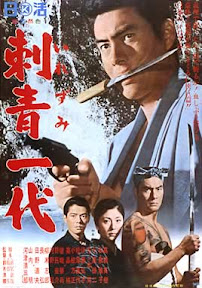 The Japanese direcor Seijun Suzuki is notorious for making genre films that became such eccentric expressions of personal style that they got him fired from the Nikkatsu Studio. This particular film comes late in his Nikkatsu tenure but finds him on relatively good behavior from the studio's standpoint. Tattooed Life is a fairly conventional drama that brackets a story of working class life and doomed romance with outbursts of yakuza violence. It's in vivid color but could pass for one of the black-and-white "Nikkatsu Noirs" or "cosmopolitan" films Suzuki had made while paying his dues at the studio.
The Japanese direcor Seijun Suzuki is notorious for making genre films that became such eccentric expressions of personal style that they got him fired from the Nikkatsu Studio. This particular film comes late in his Nikkatsu tenure but finds him on relatively good behavior from the studio's standpoint. Tattooed Life is a fairly conventional drama that brackets a story of working class life and doomed romance with outbursts of yakuza violence. It's in vivid color but could pass for one of the black-and-white "Nikkatsu Noirs" or "cosmopolitan" films Suzuki had made while paying his dues at the studio.Like many of the Nikkatsu Noirs collected in Criterion Eclipse's essential box set, Tattooed Life deals with characters who are waiting for a chance at a better life. But while the "cosmopolitan" films are set in their present day, Suzuki's film is a period piece, set in 1926, aka Showa Year One, the first year of Emperor Hirohito's reign. The heroes' waiting, meanwhile, is complicated by the fact that they're fugitives from justice. Testu (Hideki Takahashi) is a yakuza, nicknamed "the White Fox," who recently carried out a hit but is now targeted for one by his own bosses. His younger brother Kenji (Kotobuki Hananamoto) aspires to attend art school, but when he sees his brother set upon by the killers, he impulsively kills one of them. Guilt-stricken, he wants to turn himself in to the police, but Testu can't stand the thought of the gentle youth in prison and proposes that they run off together.
They end up in a port city in northern Japan where business is booming. Well before Japan invaded Manchuria, Japanese migrant workers were making a living there, and that's where the brothers intend to make a fresh start. But they have to start from scratch after they get swindled by a local bar owner who promises to get them passage on a steamer. They end up going to work on a tunnel construction project for the Yamashita family, and once they settle in to the working-class community of roughnecks and losers, each gets a romantic storyline. Interestingly, Kenji ends up falling dangerously for the boss's wife, while his elder brother, a more reticent Tetsu, struggles to resist the affections of the boss's daughter. Tetsu has kept aloof from the crowd, notably refusing to bathe with his co-workers. The reason, of course, is that he doesn't want to show the tattoos that identify him as a yakuza. Once badges of pride and belonging, Tetsu now regards them as brands of shame. He isn't like that any more, which is what they all say just before the past comes strolling into town to prove them wrong.
The tunnel workers are capable of some rough justice themselves. Here they subject one of their own to water torture to find out who's been sabotaging their project.
Thanks to its nuanced portraits of the brothers and the people around them, Tattooed Life ends up being one of the most humane of the Suzuki films I've seen to date. It's also one of the most naturalistic, making good use of outdoor locations on the coast and along a river. Suzuki saves his more typical pyrotechnics for the very end of the picture, when Testu at last puts on his "White Fox" kimono and settles scores. The director has Takahashi run amok in a traditional home, stepping through layers of passageways deeper into the frame, then racing horizontally across the wide screen to engage the enemy. Suzuki catches the action from above and below, shooting down from an imaginary ceiling and up through a transparent floor. If anything, the gimmickry seems wrong because Suzuki has been so restrained until then, but the dynamism of it all overcomes any objections.
In one respect, Tattooed Life is more noirish than the so-called "noirs" marketed by Criterion. Those films often had happy endings, or at least victories for their protagonists, but Suzuki's movie takes the more familiar noir line that one can never really escape the past, especially when you have to answer for it. The villains are defeated, of course, but the film ends with one brother dead and the other going to jail, with romance possibly to come only after more years of waiting. Despite the violent climax, this is a sobering rather than exhilarating story, and it may be the last time that Suzuki could really take the genre seriously. It was worth his trouble to do so.
No comments:
Post a Comment